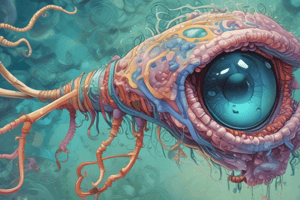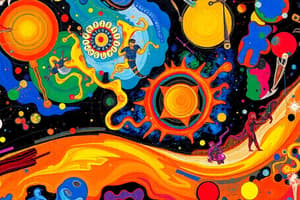Podcast
Questions and Answers
What does the term 'evolution' literally denote?
What does the term 'evolution' literally denote?
- A static state
- A reversible process
- A slow and progressive change (correct)
- A sudden change
Where did life originate according to the text?
Where did life originate according to the text?
- In space
- In the air
- On land
- In water (correct)
Which theory is mentioned as an explanation for the origin of life?
Which theory is mentioned as an explanation for the origin of life?
- Theory of Relativity
- Theory of Special Creation (correct)
- Quantum Theory
- Big Bang Theory
What kind of change does evolution involve?
What kind of change does evolution involve?
Which of the following best describes organic evolution?
Which of the following best describes organic evolution?
Life forms with complex organization arise from:
Life forms with complex organization arise from:
Which of the following is NOT a type of evidence for evolution mentioned in the content?
Which of the following is NOT a type of evidence for evolution mentioned in the content?
According to the doctrine of organic evolution, how long ago did life forms start to change gradually?
According to the doctrine of organic evolution, how long ago did life forms start to change gradually?
Which of the following describes an aldose?
Which of the following describes an aldose?
What is the general formula for carbohydrates?
What is the general formula for carbohydrates?
Which compounds are primarily classified as organic compounds within biomolecules?
Which compounds are primarily classified as organic compounds within biomolecules?
What are carbohydrates also known as?
What are carbohydrates also known as?
Which functional group is present in ketose carbohydrates?
Which functional group is present in ketose carbohydrates?
How many types of chemicals are present in a cell according to the given information?
How many types of chemicals are present in a cell according to the given information?
Which statement correctly describes the role of macromolecules in cells?
Which statement correctly describes the role of macromolecules in cells?
Which of the following groups of life compounds is classified as inorganic compounds?
Which of the following groups of life compounds is classified as inorganic compounds?
Flashcards are hidden until you start studying
Study Notes
Evolutionary Biology
Life and its Origin
- Life on earth originated in water, and simple life forms changed over time to adapt to their surroundings
- Evolution is a slow, progressive, irreversible change that has resulted in complex plants and animals from simpler organisms over millions of years
- The term "evolution" refers to the process of continuous change, which applies to living organisms, planets, stars, and even the earth's topography
Theories of Origin of Life
- Various theories have been proposed to explain the origin of life on earth
- One of the theories is the Theory of Special Creation, which suggests that life was created by a divine being or superior power
Evolution
- Evolution can be defined as a slow and progressive change resulting in complexity from simple and lower organisms
- The doctrine of organic evolution states that present-day life forms with complex organization have arisen by gradual changes from simple forms that lived in the past
- Evolution is supported by various types of evidence, including anatomical, paleontological, embryological, morphological, and biochemical evidence
Theories of Evolution
- Iamarekisen, Darwinism, and Neo-Darwinism are different theories of evolution
- These theories propose different mechanisms for the evolution of life on earth, such as natural selection and genetic variation
Human Evolution
- The position of humans in the animal kingdom is closely related to other primates, such as monkeys and apes
- There are differences between new world monkeys and old world monkeys, as well as between apes and humans
- The evolution of modern humans began from anthropoid ancestors, and has involved a series of changes over millions of years
Biomolecules and Cell Biology
- Biomolecules are the basic and essential molecules of life, forming the building block and molecular basis of life.
- They vary in size from simple molecules like carbon dioxide and water to macromolecules like proteins.
- Biomolecules can be classified into two kinds: organic compounds and inorganic compounds.
Biomolecules Classification
- Organic compounds: Carbohydrates, Proteins, Fats, and Nucleic Acids.
- Inorganic compounds: Water, Minerals, and salts.
Carbohydrates
- Carbohydrates are essential biomolecules composed of carbon, hydrogen, and oxygen in the ratio of 2:1.
- The general formula of carbohydrates is $C_n(H_2O)_m$.
- Carbohydrates are also known as saccharides (Gr.saccharon = sugar).
- They are aldehyde and ketone derivatives of polyhydroxy alcohol.
- Carbohydrates can be classified into two types:
- Aldoses: Containing an aldehyde group (-CHO) in the terminal position.
- Ketoses: Containing a ketone group (=C=O) in the subterminal position.
Cellular Pool
- The collection of biomolecules in the cell is called the cellular pool.
- A cell possesses around 5000 types of chemicals, which carry out approximately 3000 types of reactions.
Studying That Suits You
Use AI to generate personalized quizzes and flashcards to suit your learning preferences.




